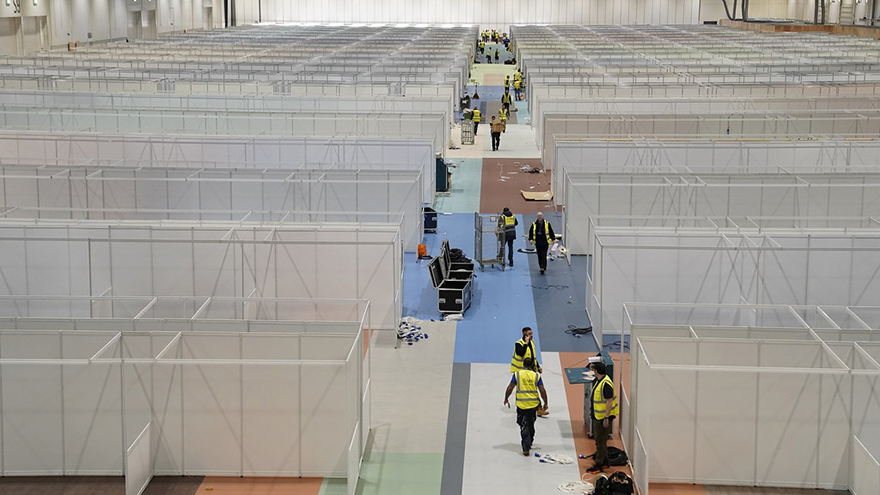Learning from a real-life, real-time situation: COVID-19 briefings
How we used real-world examples from the pandemic in our teaching.

When the coronavirus pandemic changed everyone’s lives one year ago (March 2020), the Blavatnik School acted quickly to recreate the Master of Public Policy (MPP)’s interactive, personalised teaching style in the virtual classroom. A collaborative effort across the whole School enabled our 124 MPP students (the MPP class of 2019) to reconvene – from almost every major inhabited time zone – in the virtual classroom at the start of Trinity term.
It was already clear that COVID-19 was quickly becoming one of the biggest public policy challenges of our lifetimes. We felt compelled to include the global response to the pandemic into our teaching content, as the ultimate real-world, real-time study of public policy in action. We quickly adapted Policy Challenge II, in which students participate in a negotiations simulation, to include a COVID-19 option among the more ‘traditional’ ones of counterterrorism and climate change.
The objectives of our MPP’s Policy Challenges are manifold – primarily we want students to analyse a real world- policy dilemma from a multidisciplinary perspective, drawing on law, economics, applied ethics, politics and sciences. In addition, the students have to grapple with ethical dilemmas and trade-offs, as well as evaluate and use evidence to inform their decisions. Across the exercise, there is a strong emphasis on teamwork, strategic thinking and communications.
For the COVID-19 option, students had to imagine they were members of a COVID-19 task force whose objective was gathering and analysing available evidence on an assigned subject area. After gathering evidence and hearing from many experts in Oxford and all over the world, including WHO COVID-19 Special Envoy David Nabarro, development economist Stefan Dercon, and global health systems expert Rifat Atun, each team was tasked with producing a briefing paper that would provide government officials and policymakers with valuable evidence and well-reasoned guidance for their responses, as well as help inform and guide recovery strategies.
The briefings were written by our MPP class of 2019 students as part of the assessment for this module; in the past few months they have been improved reviewed by experts and we’ve decided to make them available publicly.
This briefing paper highlights transferrable best-practice responses employed to meet the new demands – driven by COVID-19 – on health systems and supply chains. It offers an index of "preparedness" to provide advice for countries with different initial capacities and infrastructure and proposes some key approaches to developing ethical frameworks.
It was written by Jasmina Bidé, Babafemi Adebola, Gulnoza Mansur, Babu Ahamed, Hakeem Onasanya, Onyekachukwu Erobu, Olga Romanova and Zirui Huang.
This briefing paper considers the effects of COVID-19 on inequalities, focusing on three areas of social policy – social safety nets, education, and working and living conditions – and outlines interventions that can prevent social exclusion.
It was written by Benjamin Ignac, Kristie Jameson, Muktai Ravindra Panchal, Davi Mamblona Marques Romão, Oksana Matiiash, Michael O'Keefe, Nasir Mohammed, Amanda Fenyves Sadalla Costa and Shabana Basij-Rasikh.
This briefing paper examines the landscape of behavioural sciences pre-coronavirus, focusing on early lessons from past pandemics, the absence of global standards and the usage of behavioural sciences in certain government responses. The paper presents selected best practices in behavioural change campaigns, including nudging long-term mindset changes, and localising adaptation and other measures to aid effectiveness.
It was written by Alexandra Spicer, Saba Asghar Ali, Raveena Joseph, Andrii Vyshnevskyi, Edgar Picon Prado, Swee Kheng Khor, Ruizhu Lin (Zoe), Callum Voge and Madeleine Chang.
Scientific research, findings and data form the bedrock of effective policy responses to COVID-19. Equally important is cross-talk between scientists and policymakers so that evidence is correctly interpreted. This briefing translates scientific findings into evidence-based policy recommendations to combat COVID-19. It was written by Michael Chen, Yi Woon Chiong, Ke Li (Catherine), Waqar Ali Khan, Innocent Twebaze Mbaguta, Socrat Aman Rana, Martina Lejtreger and Carolina Martinelli.
Emily Jones is Associate Professor in Public Policy and Anna Petherick is Departmental Lecturer in Public Policy. They are the convenors of Policy Challenge II at the Blavatnik School of Government.
Nightingale Hospital London for Covid-19, March 2020. Photo: Andrew Parsons / No 10 Downing Street
